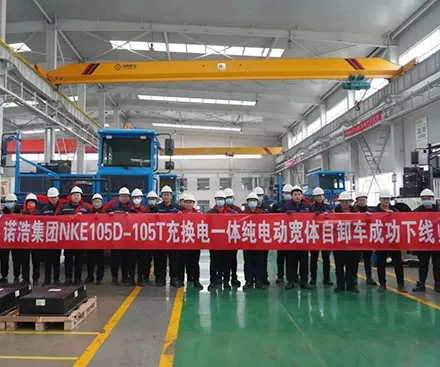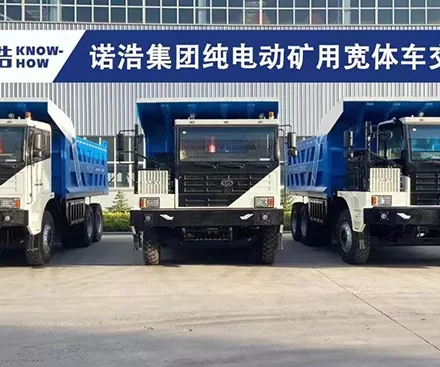The construction industry is experiencing a revolution with the advent of electric excavators. Traditionally dominated by powerful diesel machines, the question arises: Can electric excavators truly match the muscle of diesel? This article delves into the capabilities, benefits, and challenges of electric excavators compared to their diesel counterparts.
Electric excavators are gaining popularity due to increasing environmental regulations and the push for sustainable construction practices. These machines operate on electricity, either through battery power or direct connection to an electrical source, significantly reducing their carbon footprint. However, the critical question is whether they can deliver the same performance as diesel-powered excavators.
The advantages of electric excavators are undeniable. They work quietly and without emissions, benefiting both operators and their colleagues on site, as well as the general public and the environment. For some construction professionals contemplating the shift from diesel to electric, however, a genuine concern emerges: do electric excavators possess the necessary power to effectively tackle the tasks at hand?
Diesel engines have long been the standard in heavy machinery due to their high power output and reliability. Diesel excavators can handle large loads, operate continuously for extended periods, and perform well in harsh conditions. Their engines produce significant torque, essential for heavy lifting and digging.
Electric excavators are making strides in matching the performance of diesel machines. Modern electric models are equipped with advanced battery technology, providing high energy density and long operational hours. While early models struggled with power limitations, recent innovations have closed the gap, making electric excavators capable of handling similar tasks to diesel ones. However, the question of sustained power and performance in extreme conditions remains a topic of discussion.
One of the most significant advantages of electric excavators is their environmental friendliness. Unlike diesel engines, which emit greenhouse gases and other pollutants, electric motors produce zero emissions at the point of use. This makes them ideal for urban construction sites and environments with strict emissions regulations. Additionally, electric excavators are quieter, reducing noise pollution and making them suitable for residential areas.
Diesel-powered machines have high fuel costs and require regular maintenance, including oil changes, filter replacements, and engine tune-ups. These costs add up over the machine's lifespan, impacting the overall budget.
Electric excavators generally have lower operational costs. Electricity is cheaper than diesel fuel, and electric motors have fewer moving parts, reducing maintenance needs. Over time, these savings can offset the higher initial purchase price of electric machinery. Additionally, incentives and subsidies for using green technology can further enhance cost savings.
A critical factor for electric excavators is battery life and the availability of charging infrastructure.
Modern electric excavators are equipped with high-capacity batteries that can last for a full working day, depending on the workload. However, heavy usage can drain batteries faster, requiring mid-day charging or battery swaps.
The availability of fast-charging stations on construction sites is still developing. Companies investing in electric excavators need to consider the logistics of charging, including the time required and the infrastructure costs. Portable battery packs and on-site generators can provide temporary solutions, but widespread adoption will depend on more robust charging networks.
Diesel engines are known for their ruggedness and ability to perform under various conditions, including extreme temperatures and high altitudes. They are less sensitive to environmental factors, making them versatile for all types of construction sites.
Electric motors are efficient and reliable but can be affected by extreme cold, which impacts battery performance. However, technological advancements are continuously improving battery resilience, and electric excavators are becoming more adaptable to different conditions.
The initial cost of diesel excavators is generally lower than electric ones. However, the long-term expenses, including fuel, maintenance, and potential regulatory fines for emissions, can add up significantly.
While the upfront cost of electric excavators is higher, long-term savings in fuel, maintenance, and potential subsidies for eco-friendly equipment can make them more cost-effective over time. Companies must consider these factors when evaluating the total cost of ownership.
The construction industry's shift towards sustainability is driving the demand for electric excavators. Manufacturers are investing heavily in research and development to enhance battery life, power output, and overall efficiency of electric machinery.
Governments worldwide are implementing stricter emissions regulations and offering incentives for using green technologies. These policies are accelerating the adoption of electric excavators, as companies seek to comply with regulations and benefit from financial incentives.
Continuous advancements in battery technology, such as solid-state batteries and rapid charging solutions, are making electric excavators more viable. The integration of renewable energy sources for charging and the development of hybrid models that combine electric and diesel power are also promising trends.
The adoption rate of electric excavators is increasing as more companies recognize their long-term benefits. Leading construction firms are already incorporating electric machinery into their fleets, and the positive outcomes are encouraging broader acceptance.
In conclusion, electric hydraulic excavators are progressively matching the muscle of diesel-powered machines. While there are challenges, particularly in terms of battery life and charging infrastructure, the benefits of reduced emissions, lower operational costs, and compliance with environmental regulations make them an attractive option. As technology continues to evolve, electric excavators are poised to become a mainstream choice in the construction industry.
For companies considering the transition, it is crucial to evaluate both the immediate and long-term impacts. Investing in electric excavators not only supports sustainable practices but can also lead to significant cost savings and compliance with future regulations.
If you need more information on electric excavators or want to get in touch with a reliable supplier, feel free to contact us for expert advice and assistance.

Jul. 23, 2022
View More
Jun. 15, 2022
View More
Jun. 01, 2022
View More